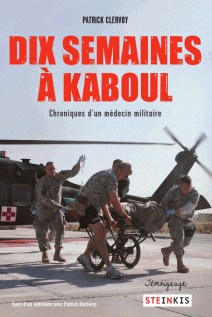The necessary eye of the psychiatrist in Afghanistan
 (BRUXELLES2) The book was published a few months ago. But I hadn't taken the time to read. In "Ten weeks in Kabul. Chronicles of a military doctor", Patrick Clervoy keeps a diary of his stay at the ISAF international forces hospital in Kabul (the KiA) and his travels according to emergencies or meetings in Kandahar, Tagab... Anyone waiting for romantic literature can go their own way. Sentences are short, choppy. Sometimes lifeless, like a distant narrative. But very quickly we are caught up in the action. Because behind the dryness of words appears the destinies of committed men and women.
(BRUXELLES2) The book was published a few months ago. But I hadn't taken the time to read. In "Ten weeks in Kabul. Chronicles of a military doctor", Patrick Clervoy keeps a diary of his stay at the ISAF international forces hospital in Kabul (the KiA) and his travels according to emergencies or meetings in Kandahar, Tagab... Anyone waiting for romantic literature can go their own way. Sentences are short, choppy. Sometimes lifeless, like a distant narrative. But very quickly we are caught up in the action. Because behind the dryness of words appears the destinies of committed men and women.
The life of the international forces hospital in Kabul continues to be punctuated by the "Nine Lines", these messages which announce in nine lines the arrival of a wounded person whose condition is critical (Alpha), serious (Bravo) or who can wait (Charlie). The soldiers, engaged, direct or collateral victims (those who saw one of their colleagues die or disappear), pass in front of the doctor, sometimes have difficulty revealing a story, often repressed for months. Patrick Clervoy is indeed the psychiatrist of the French contingent. A presence that has imposed itself over the course of events. Since the tragedy of Uzbin, in 2008, psychological care directly with the troops has imposed itself in the same way as the resuscitator or the surgeon.
A war in two stages
The author reminds us. Every war generates psychological disorders that evolve in two stages: immediately at the time of exposure to combat, then, insidiously, several years later ". And to recall some figures which, very often, send shivers down your spine. Because they are not always glorious. " In the early months of the Korean War, American troops faced a very high psychiatric casualty rate, a quarter of the total wounded. During the Yom Kippur War, of the first 1500 Israeli soldiers evacuated, 900 were for psychiatric disorders. This is for the first time.
For the second, it is not better. " The Falklands War in 1982 killed 214 British people in three weeks. In more than thirty years, 260 veterans of this war had taken their own lives. Suicide took away more veterans than had fallen fighters at the time of the fighting. »
Another figure, to grasp the extent of the problem. What army doctors called the mild trauma brain injury or mTBI (moderate concussions). " In 2008, 300.000 American veterans were listed as suffering from mTBI. The number will likely more than double after the forces withdraw ... in 2013. As the American contingent constitutes two-thirds of the coalition, we can anticipate that more than one million veterans will suffer from this pathology” among the coalition forces deployed in Afghanistan. We understand better this sentence of the psychiatrist which sounds like a warning. “What will become of the soldiers I saw here? For some, as little as possible I hope, the course will be difficult. »
• Ten weeks in Kabul. Chronicles of a military doctor", Patrick Clervoy. Editions Steinkis. November 2012. 296 pages. Price: €19,90.


